Vinegar is one of those items that has so many uses. A staple of the pantry, vinegar is commonly used for cleaning, cooking, getting rid of odors, and so many other things. In fact, vinegar has so many different uses that it should be a part of your preparedness kit in case of an emergency.
Here are just 50 of the many survival uses for vinegar that will encourage you to add it to your preparedness kit today.
Unclog Drains
Combine baking soda and vinegar to unclog a plugged drain.
Clean Wounds
Vinegar kills bacterial pathogens and contains acetic acid, which works the same way antiseptics do. These properties make vinegar perfect for cleaning and disinfecting cuts and wounds.
Manage Diabetes
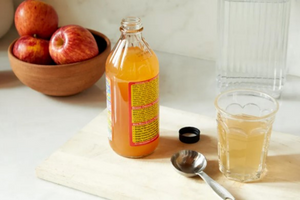 Vinegar, particularly Apple Cider Vinegar (ACV), has been shown to help lower blood sugar after meals when 20ml is diluted in 40ml of water and may also be used to help moderate blood sugar after waking up.
Vinegar, particularly Apple Cider Vinegar (ACV), has been shown to help lower blood sugar after meals when 20ml is diluted in 40ml of water and may also be used to help moderate blood sugar after waking up.
Related: Making Raw Apple Cider Vinegar at Home
Soothe Bug Bites
Dabbing vinegar on a bug bite will reduce swelling and ease soreness around the site.
Heal a Sunburn
A well-diluted mixture of Apple Cider Vinegar and water can help ease irritation from sunburn. Apple Cider Vinegar diluted in water can be applied to the affected area using a cloth soaked in the solution, a spray bottle, or by adding it to a cool bath.
Cure Hiccups
Having hiccups is annoying, but vinegar can provide relief. Add 1 teaspoon Apple Cider Vinegar(ACV) to 1/3 cup water and drink the mixture to stop hiccups.
Ease a Sore Throat
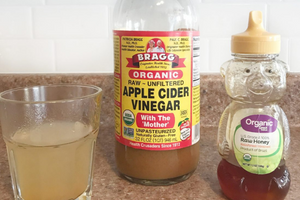 While a sore throat will usually subside on its own, vinegar can help provide some relief.
While a sore throat will usually subside on its own, vinegar can help provide some relief.
ACV can kill bacteria, and ease the inflammation associated with a sore throat. Try mixing diluted ACV with honey and drinking the mixture to soothe a sore throat. You can also gargle with ACV for quick relief.
Reduce Inflammation
For years, people have claimed that wrapping a sprained or sore body part in a cloth soaked in vinegar helps reduce swelling and inflammation.
Support Digestive Health
Proper digestion is key to a healthy body, yet millions of people suffer from digestion issues.
One to two teaspoons of ACV in an 8oz glass of water before eating can aid healthy digestion and reduce bloating and heartburn for many people.
Remove The Smell Of Smoke And Other Odors
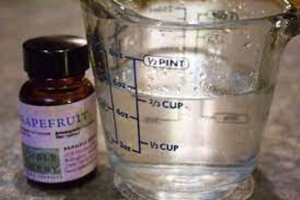 While it is not necessarily a life-saving tip, vinegar is an excellent tool for combatting odors and freshening fabrics.
While it is not necessarily a life-saving tip, vinegar is an excellent tool for combatting odors and freshening fabrics.
Dilute vinegar in water and spray on fabrics to freshen them and remove odors. You can also add a splash of fabric softener or essential oils to create a more pleasant experience.
Cure Heartburn
Many people swear by the use of vinegar to ease heartburn. Swallowing just a tablespoon of vinegar can quickly provide relief.
Ease An Upset Stomach
Much like treating heartburn, vinegar is also used by many to ease an upset stomach.
Related: 5 Natural Painkillers To Use Instead Of Opiates
Drinking a mixture of ACV and water will soothe an upset stomach in seconds.
Remove Stickers
This is another tip that may not be life-saving, but it sure is handy to know. Stubborn stickers can be removed using vinegar. This tip can come in handy when acquiring items secondhand.
Make Those Bugs, Bug-off
If you have ever been outside, which I am sure you have, you know how annoying bugs can be.
Kill Weeds
There is no doubt that vinegar has many great uses, and some are in the garden.
Use a mixture of vinegar and dish soap to kill weeds in the garden and grow healthier plants.
Related: Edibility Test: Find Out Which Backyard Weeds are Edible
Be aware the acid found in vinegar can kill other plants and weeds and should be applied as directly as possible.
Get Rid Of Moss
Another outdoor use for vinegar is to kill moss.
Combine 1 tbsp of white vinegar or ACV with 1 gallon of water and spray the mixture on mossy areas of the garden, carefully saturating the top layer. Repeat daily until the moss dies.
Trap Those Annoying Fruit Flies
Add a small drop of dish soap to a dish and top with some ACV. Next, cover the mixture with plastic wrap with holes poked in it and leave it out to trap fruit flies easily.
Clean and Sanitize Any Surface
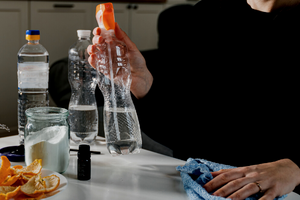
The best thing about vinegar is that it can be used on almost any surface without fear of damage.
Since vinegar is antibacterial and kills many bacteria on contact, it is an excellent option for quickly sanitizing items before use.
Remove Hardwater Stains On Plastic
Hard water wreaks havoc on all surfaces and is difficult to remove. You can use vinegar to remove hard water stains from plastic and bring containers back to life.
These containers can then be used for food storage in times of need.
Prevent Bacteria Growth
As explained, vinegar can kill microorganisms such as bacteria and viruses. Due to its antimicrobial properties, vinegar has been used to treat ear infections, warts, and nail fungus, among other things.
Related: How To Make Tea Tree Oil To Treat Infections
It has also been used to treat certain skin infections and burns. Vinegar is a multipurpose product that should be placed in any preparedness kit.
Disinfect Your Cutting Board
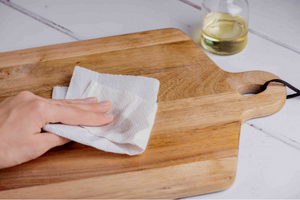 Cutting boards can be home to a plethora of bacteria, and without proper sanitization, that bacteria can end up wreaking havoc on your body.
Cutting boards can be home to a plethora of bacteria, and without proper sanitization, that bacteria can end up wreaking havoc on your body.
Clean and sanitize cutting boards using vinegar to kill bacteria and keep your family safe.
Freshen Up The Air
Again, this may seem insignificant, but vinegar can be used to freshen the air.
Mixing vinegar and water in a spray bottle and adding in fabric softener or essential oils can help keep any space smelling fresh.
Sanitize Jars And Containers
Food storage is vital to preparedness, and having containers and jars that are clean and sanitary is vital to safety.
Use vinegar to safely clean and sanitize jars that will be used to store prepared or pickled foods.
Create A Grease-Cutting Scrub For Pots And Pans
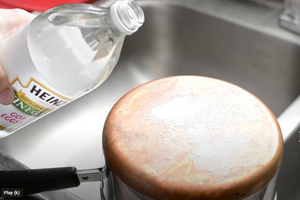 A well-known household tip that can come in handy during a crisis is the use of vinegar to create a scrub for pots and pans. Combine equal parts salt and flour with just enough vinegar to create a paste.
A well-known household tip that can come in handy during a crisis is the use of vinegar to create a scrub for pots and pans. Combine equal parts salt and flour with just enough vinegar to create a paste.
Related: How To Properly Clean And Season Your Cast-Iron Cookware
You rub this paste over any cookware or utensils, rinse with warm water, and dry thoroughly with a soft dishtowel.
Treat Dry Skin And Eczema
Many people who suffer from eczema report that ACV provides them some relief. ACV has beta-carotene, which aids in skin cell renewal.
It is also rich in potassium, has high concentrations of minerals, and contains lactic acid.
This means ACV can help treat and heal eczema. To use ACV for eczema, you have a few options:
- Use it as a moisturizer – mix 1 tbsp with coconut oil.
- Use it as a toner – Coat a cotton ball and dab it on your face.
- Use it on your hair – Mix with sunflower oil to use on your hair.
- Use it in the bath – Add 2 cups of ACV to a full tub.
- Drink it – 1-2 tbsp in an 8 oz glass of water each day.
- Combine it with honey – Combine 2 tbsp ACV with 1 tbsp honey in a glass of water and consume 2-3 times a day with meals.
- Mix it with baking soda – Half a cup of water, ¼ tbsp baking soda, 2 tbsp ACV and drink. You can add 1 tbsp of honey if you wish.
Treat Nail Fungus
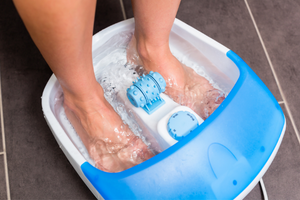 Since vinegar is known to kill bacteria and fungus, many people use it to treat nail fungus.
Since vinegar is known to kill bacteria and fungus, many people use it to treat nail fungus.
To treat nail fungus with vinegar, you simply soak the nail in diluted vinegar a few times a day until the fungus subsides. A mixture of 1-to-1 works best for this treatment.
Stop Car Windows From Frosting Over
If you have ever survived a northern winter, you know the way windows tend to freeze over and how annoying it is to wait for the defrost in your car to clear that frost.
Related: How To Prepare Your Car In Case You Have To Live In It
Vinegar can quickly clear frost from windows when cold because it will not freeze and does not leave streaks on the window.
Eradicate Mildew
If you find that your bathroom has a build-up of mildew, you can reach for a bottle of vinegar.
Vinegar is a safe, natural choice for all kinds of cleaning and works well to destroy mold and mildew fast.
Get Rid Of A Wart
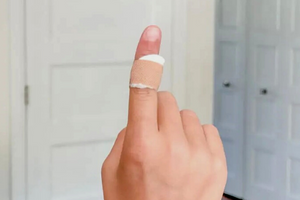 If you find yourself with an unwelcome friend, vinegar may be able to help.
If you find yourself with an unwelcome friend, vinegar may be able to help.
With clean hands, take a cotton ball soaked in ACV and apply it to the wart in question, covering it with tape to hold it in place. This treatment works best when it is done before bedtime and removed in the morning.
Soften Calluses
Vinegar can be used to soften calluses when needed. Create a foot soak by mixing 2 cups of lukewarm water with 1 cup of ACV.
Related: 36 Survival Uses For Hydrogen Peroxide
Many people also add salt to the mixture as well. Soak the calluses for 20 minutes and then treat them with a pumice stone to remove any hard skin. Pat dry and repeat as needed.
Fight Mold
As with mildew, vinegar can also be used to reduce and remove mold.
Disinfect Your Toilet Bowel
Toilets are disgusting. If you can not get your hands on toilet bowl cleaner, vinegar works the same way and gives you a clean bowl free of bacteria.
Clean And Sanitize The Toothbrush Holder
Vinegar is so safe that it can be used on or around objects that will go into your mouth. For example, vinegar can be used on a toothbrush holder without fear.
Use Vinegar In The Washing Machine
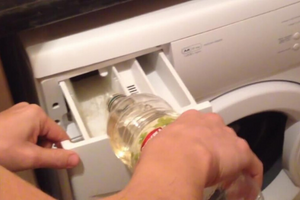 Using white vinegar in the washing machine helps to remove hard water build-up, mildew, or mold. It also makes clothes come out brighter, cleaner, and stain-free.
Using white vinegar in the washing machine helps to remove hard water build-up, mildew, or mold. It also makes clothes come out brighter, cleaner, and stain-free.
Related: How to Make Your Own Semi-Automatic Off the Grid Washing Machine (No Electricity)
Scale Fish With Less Effort
One interesting use for vinegar is in scaling fish. Vinegar will work to loosen fish scales, making them easier to remove for food preparation.
Dissolve Glue
Vinegar has many talents and uses. One of these talents is loosening and removing tough glue from many surfaces. Depending on the surface, type, and amount of glue to remove, you will soak the area with white vinegar and wait for it to loosen.
You may want to begin with diluted vinegar to ensure it does not damage the surface, but in most cases, however, it is safe to pour vinegar directly on the area to break down the glue.
Vinegar is an excellent tool for removing wood glue and wallpaper glue. It also works to strip glue residue from glass, loosens the glue from stickers, removes glue on plastic and many other types of adhesive on various surfaces.
Eliminate Bacteria And Freshen Fabrics
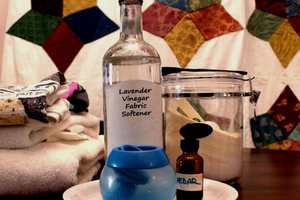 Vinegar is an excellent tool for freshening fabrics and removing odors.
Vinegar is an excellent tool for freshening fabrics and removing odors.
As explained previously, mix water, vinegar, and fabric softener or essential oils.
This vinegar solution kills bacteria and provides a fresh scent.
Clean Produce
Wash your produce in 4 cups of water and 1 cup of vinegar to keep it fresh and pest-free. Soaking fruit in vinegar will also help remove the wax coating on grocery store fruits.
Preserve Food
One of the most common uses for vinegar is to preserve food. Preserving food in vinegar means the food will become long-lasting and retain its crisp, flavorful qualities.
While most people use plain white vinegar for pickling, ACV can also be used and may enhance the flavor of the preserve.
There are hundreds of pickling recipes available online, and most provide easy-to-follow instructions.
Revive Wilted Vegetables
Not only can you wash your vegetables in vinegar, but it is also great for giving life to wilted vegetables. To revive wilted veggies, soak them in water with a little bit of vinegar and sugar.
Replace Lemon Juice
If a recipe calls for lemon juice and you find that you are all out, you can substitute vinegar in its place.
Vinegar is also great when creating large batches of tomato sauce to store for later use as it keeps it fresh and bacteria-free.
Purify The Air
Vinegar will not only freshen the air, but it will also kill any floating bacteria, therefore purifying the air in your home.
Lift Stains
We have all had a white shirt ruined by sweat stains. Thankfully, vinegar can help lift those stains so you can continue to wear your favorite item of clothing.
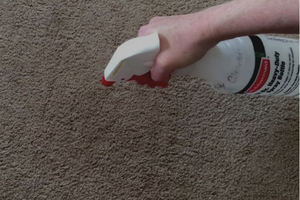
It can also remove stains from carpets.
To use vinegar to remove stains, simply soak the item in vinegar for 15 minutes to a few hours (depending on the strength of the stain).
Then wash with a laundry booster added to the washing machine.
Remove Pesky Pet Odors
We mentioned how vinegar could be used to reduce and eliminate odors in your home. Pet odors are one of those smells that are difficult to get rid of, but vinegar works great for lifting the smell and reviving the area.
Germinate Seeds Faster
Soaking seeds in vinegar aids the germination process by breaking down the seeds’ outer layer faster and encouraging sprouting.
Related: 20+ Must-Have Seeds For The Upcoming Crisis
Deter Those Garden Pests
If you have ever had a garden, you know how annoying garden pests can be to your plants.
Vinegar will repel various garden pests and is safe enough to use in the soil surrounding your garden to rid yourself of everything from snails and slugs to aphids and ants.
Destroy Dandelions
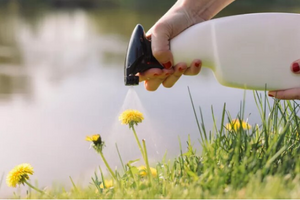 Dandelions can quickly take over your yard and leave you swimming in a sea of yellow.
Dandelions can quickly take over your yard and leave you swimming in a sea of yellow.
Luckily, vinegar is a safe and effective way to kill this invasive weed and keep your lawn looking perfect.
Horticultural vinegar is best for ridding your yard of dandelions.
Horticultural vinegar contains 20% acetic acidic compared to the 5% in regular vinegar. While permanent removal with vinegar is around a 50-50 chance, it will remove many of them from sight.
Related: Harvesting and Using Dandelion Roots – The Natural Detoxifier
Vinegar and Dandelions:
- Add one gallon of vinegar to a bucket.
- Mix in 2 tbsp of dish soap or 10ml per gallon.
- Spray the mixture onto weeds on a sunny day when it is warm outside. Ensure that you soak all exposed parts of the plant, avoiding the grass as much as possible.
- Repeat daily until the weeds die or as needed.
Say Goodbye To That Ant Colony
As stated above, vinegar can help you combat an ant problem. Mix white vinegar with water and spray it on areas that are infested. You can also spray the mixture directly on the anthill to quickly eliminate this pest.
Make Paint Stick To Cement
If you have ever tried to paint cement, you know the struggle. The paint will not adhere to the surface and always winds up peeling rather quickly. If you wash the area with vinegar before painting it, it will stick better and last longer.
Improve the Lifespan of a Wick
Oil lanterns are a must-have in case of an emergency. However, oil lanterns often flicker and fade. You can prevent this by soaking the wicks of lanterns in vinegar to help preserve them and make them more absorbent of the oil.
You may also like:
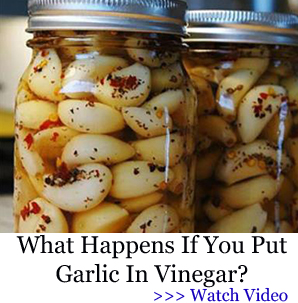 Top 6 Popular Types of Guns Not Suitable for SHTF
Top 6 Popular Types of Guns Not Suitable for SHTF
American Beech Nuts – A Staple At The Grocery Store 100 Years Ago (Video)
18th Century Skills That Will Become Life-Saving When SHTF
Why You Should or Shouldn’t Consider A Chamber Adapter If You Are A Serious Prepper

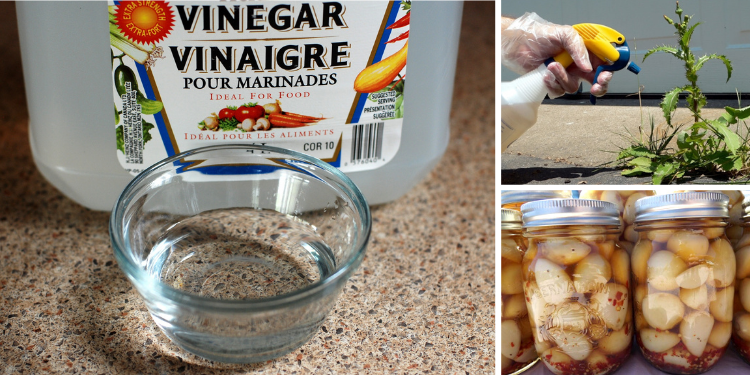
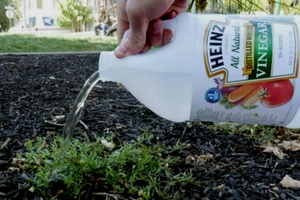







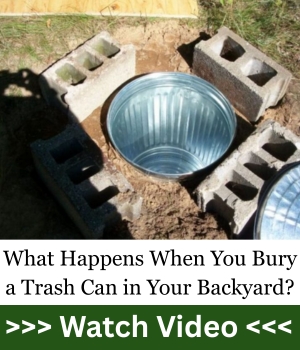






cool article
did not know there were so many uses.
The smell is a little strong.
Hate to say it, takes me back to when I was a little boy and the smell that came from that old red rubber bag that hung from the shower. ?
Funny, it can be use in that way but man dose it make good pickles.
Thank you…
Pretty good but two things.
#1 Using vinegar on a limestone countertop will destroy the nice polished stone leaving a rough ugly surface difficult to kneed bread on.
#2 Dandelions are a resource, a spring tonic herb our forefathers brought over from Europe for spring tonic herbs. As Spring was known as the starving season as root cellars and preserved foods were running low awaiting spring planting and that 100 some odd days until first crops.
In the era of sterile green grass monoculture aka Scotts Yards aka Roundup yards Dandelions are an indicator that area hasn’t been ruined for heirloom gardening. Roundup destroys everything green aside from grass and roundup ready GMO crops. Sadly the next year weeds will comeback unless Roundup is used again but it take a couple of years before Heirloom Veggies can grow there properly.
As the article says Vinegar is a good point killer of unwanted plants. If you use Horticultural 30% Vinegar it is CAUSTIC to skin, eyes and your lungs so read the directions and use protective gear.
Vinegar is an acid.
Corrosive is a better word than caustic,
which is used to describe ‘base’ materials.
Vinegar and water in a spritz bottle was helpful for jellyfish stings at the beach on Hilton Head.
last summer i thought about putting vinegar in my fish scaler to loosen scales just like pickling fish softens the bones . and it worked cut the scaling time by 2/3rds
Vinegar is excellent for rust removal. Submerge the rusted item in vinegar over night and just brush off the rust the next day. It also works well for pickling carbon steel. It turns the steel dark Grey to black and prevents further rust.
Vinegar can also be used to clean corrosion caused by leaky alkaline batteries. The acid in the vinegar counteracts the caustic alkali from batteries. Use a cotton swab or cotton ball soaked with a water and baking soda solution to complete the cleaning.
Put a teaspoon of vinegar in the water that you use to boil eggs in. The vinegar breaks down the shell a bit making them easier to peel.
i doubt it would work on the toenail fungus but i’ll give it a try. Feet got pretty torn up from the military life.
Options for toe nail fungus –
Vinegar at one part vinegar to two parts warm water for up to 20 minutes in a foot bath.
Amber colored Listerine that has menthol, thymol and eucalyptus in a foot bath.
Apply tea tree oil directly to the toe nail.
Apply oregano oil directly to the toe nail. For more sensitive skin, dilute with a carrier oil.
To support your nails internally, eat some probiotic-rich yogurt and add some collagen or gelatin to your drinks.
Vinegar on galvanized steel allows the paint to adhere to the surface like nothing else!
Good tip?
One thing that was left out was you use vinegar to put a hard boiled egg in a soda bottle.
Any one know how????
I will tell you the next email from Prepper
Works on toenail fungus; with a caveat- it must not only contact the infection it has to soak the affected tissue (same reason topicals fail to cure). Best bet is a foot bath with 4-5 cups very warm water and 1 cup ACV or distilled ( white) vinegar. soak until water cools – depending on how severe the infection is may take weeks to completely kill the fungus colony. A capfull or two of plain bleach and a bit of dish detergent will ease scraping the dead skin and etc from the nail . Vapo-rub also works but in my experience takes longer and is messy.
What a great list of uses in this artilcle! Many I have never heard of. I appreciate the additional helpful hints in the comments.
Make your own! If you like sourdough, the water on top can be taken to ferment and used. It’s a grain vinegar and those are very pricy, when you can find them. Look at how much a small bottle of rice vinegar costs. niio
red could you explain this a little more? I’ve been dumping my sourdough “liquor” when I feed my sourdough.
Would love to use it instead.
Michael: Dump that liquid in a jug with a cloth stuck in it. Let it finish fermenting there. Mid it for unwanted things. Yeast will form on top but that isn’t a bad thing. It can be taken a frozen for bread and so on. unless using a brewers yeast, expect the vinegar to be cloudy. We like Asian, so it’s rice sourdough and rice wine vinegar. If using koji, do not cap. the fungus needs oxygen to work.
One thing I like is to make the sourdough more liquid (about like batter), put it in the jugs and all it to ferment till soured. When the vinegar rises to the top, rack it into a clean jug. Sourdough should keep, capped, at room temperature for months. It should be acid enough to kill anything trying to work in it.
If into beer, cap the liquid for a few weeks. For beer, do not use a glass jug. niio
Sorry red your explanation is unclear.
Anybody have a website that explains vinegar making aside from the classic fermenting apples and such?
Thanks
@ RED: This is incoherent:
“Mid it for unwanted things. Yeast will form on top but that isn’t a bad thing. It can be taken a frozen for bread and so on. unless using a brewers yeast, expect the vinegar to be cloudy.”
Could you please explain better?
Thank you
Day one prepper training survival…. Dandelions are edible…
This article kill dandelions with vinegar.
?♂️
and dandelions are bees’ first fuel of the winter into spring. without bees, you’ll be pollinating your garden by hand with a paint brush!!!
blackbean: down here, Arizona, it’s phacelia. It comes up in late winter, blooms for a few weeks, and dies off. But, when I sent pix to a younger brother, he’d been living in Ohio for decades, he didn’t recognize it. But, his daughter, who lives in Germany, did. Our little weed is the most popular flower in the world for beekeepers. We went thru a bad drought and most honey bees died out. Plenty of native bumble bees and yellow jacket wasps are around to more than make up for them. niio
I SAW THAT!! I was truly surprised! You would think anyone reading this site would know not to kill dandelions!
No one said KiLL every dandellion. Just kill them where they don’t belong
Just FYI: there are many recipes out there for cleaning that say to mix vinegar with soap…vinegar is an acid, soap is a base, mixing these two together will cancel each other out!!! Please don’t wast your vinegar or your soap and don’t mix them together.
As well, DON’T MIX VINEGAR WITH BLEACH, OR OTHER CHEMICALS AS IT MAY CREATE A DEADLY GAS!
There should be some distinction in this post regarding ACV (Apple Cider Vinegar) and White vinegar. ACV may discolor clothing and other fabrics where White most likely won’t.
Also, if you care: white vinegar is made with corn, a GMO product unless it says otherwise, and almost ALL white vinegar is made using petroleum products unless it states it is made from GRAIN (organic means not GMO, not organic means GMO corn)
And YES: dandelions are beneficial to us and necessary for the benefit of bees as dandelions come out and flower before many other flowers so the bees can survive. Using CHEMICAL weed killers is KILLING bees that are NECESSARY for OUR survival. Please don’t kill dandelions! Replant in a location if you don’t want them in your yard.
Dandelion is a medicinal plant